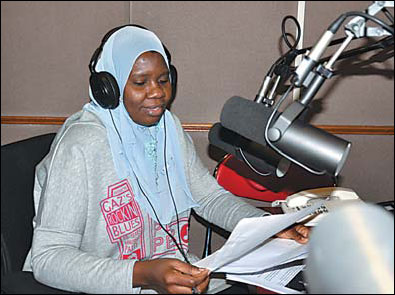Tanzanian Swahili broadcaster has China in her eyes
 |
|
Pili Mwinyi Khamis prepares a broadcast in the CRI studio. Liu Xiangrui / China Daily |
Pili Mwinyi Khamis works for China Radio International (CRI) and she is involved in the production of several programs, including the weekly China in My Eyes. Khamis, 38, was also among 20 foreign experts invited by China's new leader Xi Jinping for a round table discussion on Dec 5.
A month later, the Tanzanian still finds it hard to contain her excitement.
"We sat around and he asked for our advice. I was so excited to be among them," says Khamis, adding the only thing she said when she shook hands with Xi was to congratulate him on his elevation.
Wearing her traditional Muslim dress with her head covered by a light blue scarf, the Swahili language broadcaster says she was surprised when her department director told her of the invitation. But although she was surprised by the honor, her colleague Chen Lianying was not.
"We all agree she is diligent and has done very well at work. More importantly, she stands out with her long experience in China and good knowledge of the country," Chen says.
 |
Khamis has worked with CRI for more than five years, and before that she was both a teacher and broadcaster in Tanzania. After she was selected for the exchange program in China, Khamis was as anxious as she was excited.
"It was my first time abroad, and I knew little about China," she says.
Lessons about the new country and its culture started the day she arrived, at the table of her welcome dinner.
Khamis, who had never even seen chopsticks before, was taught to use them by her colleagues. It took her more than a week to master the art, and then she was teaching her husband, who had come to China with her and was starting a business.
"Now we find chopsticks even more comfortable than forks and knives," she says.
To Khamis, China was very different from what she had in mind, especially its degree of development.
"I found it's more like a developed country," she says.
Khamis began to love her job as a journalist here, which she believes helps her understand China better and faster.
Her work takes her out of Beijing and around China. Last year, she had a chance to visit Ningxia Hui autonomous region, where she found herself surrounded by Muslims.
"I saw men wearing Muslim caps and women covering their heads. We had so much in common. It was like going back home," says Khamis, impressed by the diversity of Chinese culture.
















